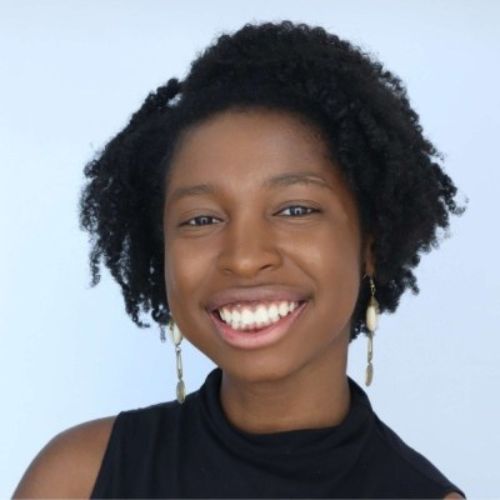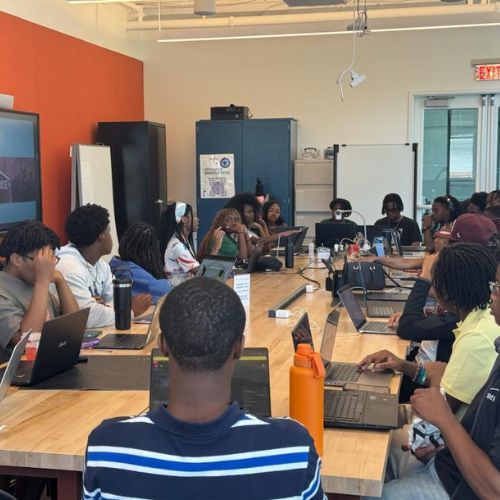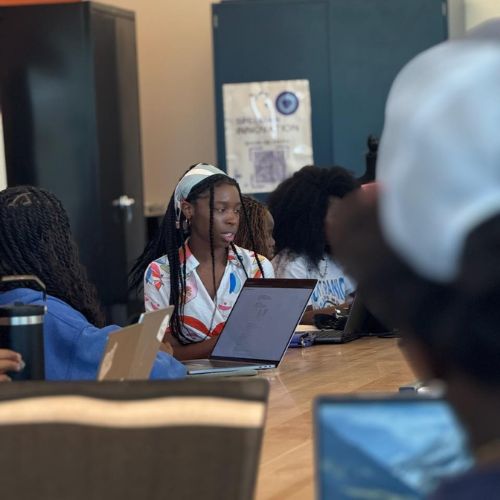How Spelman’s AI Innovation Scholar is Shaping an Inclusive Tech Future
Redefining AI: Black Women Leading the Next Tech Wave at Spelman
 Blanca Burch, C’2022, an AI Innovation Scholar at Spelman College, isn’t just studying the future of technology—she’s actively shaping who gets to build it. Working within the Arthur M. Blank Innovation Lab, Burch is championing a critical mission: to ensure that Black women and underrepresented communities are at the forefront of the AI revolution, transforming it from a tool of exclusion into a catalyst for social mobility.
Blanca Burch, C’2022, an AI Innovation Scholar at Spelman College, isn’t just studying the future of technology—she’s actively shaping who gets to build it. Working within the Arthur M. Blank Innovation Lab, Burch is championing a critical mission: to ensure that Black women and underrepresented communities are at the forefront of the AI revolution, transforming it from a tool of exclusion into a catalyst for social mobility.
Burch's work centers on closing the gap between the promise of artificial intelligence and its current, often biased, reality. Her focus is on both education and original research that addresses real-world issues. The Milwaukee, Wisconsin, native also recognizes that not everyone is eager to embrace AI. “My typical response to people who hold AI resistance is that hesitation regarding these tools is extremely valid and that their voices are important in how these tools are going to be developed and utilized,” Burch said. “Since many of these tools are still in their infancy, they are changing every day, and there is still a big need for regulations and guidelines.”
As the AI Innovation Scholar, her focus is on creating an environment where the Spelman community can explore and build confidence with AI through creativity, critical thinking, and collaboration. To achieve this, she leads a workshop series in the Innovation Lab that helps students, faculty, and staff "gain fluency in AI tools and ethics while imagining how these technologies can serve their fields."
Burch has helped to host a series of workshops this semester. Workshops such as Prompting Power: AI at Your Fingertips, Safely Engaging with AI, My GPT, My Way, AI Runway Remix, AI Research Lab, AI in Your Pocket, Wild Card AI, and Prototyping Your App or Website in Minutes.
Building an Ethical and Inclusive Future for AI
 Her most immediate research project directly addresses systemic bias. "I am also conducting my own research with a project, ‘In The Context of Curls’, which explores the accuracy of AI-generated images of Black hairstyles and textures," Burch explained. "The goal of the research is to highlight biases found in the current generative systems and advocate for more inclusive datasets and design practices for tools that are going to be implemented in the future."
Her most immediate research project directly addresses systemic bias. "I am also conducting my own research with a project, ‘In The Context of Curls’, which explores the accuracy of AI-generated images of Black hairstyles and textures," Burch explained. "The goal of the research is to highlight biases found in the current generative systems and advocate for more inclusive datasets and design practices for tools that are going to be implemented in the future."
Through these efforts, Burch continues to bridge classroom learning with hands-on experimentation, encouraging students to not only understand emerging technologies but also to question and shape them responsibly. Her workshops and research initiatives emphasize both creative exploration and critical engagement—ensuring that innovation remains inclusive, ethical, and grounded in real-world impact.
Jaycee Holmes, C’2016, co-director of the Innovation Lab and an assistant professor in the Department of Art and Visual Culture, highlighted how Burch's work translates to real-world applications for underserved communities.
“Blanca heads a crucial research project with her student team investigating the gaps of Black hair textures and hairstyles in the datasets leveraged by commercial AI models, aiming to combat systemic algorithmic bias and resulting discrimination against Black women,” Holmes said. “Additionally, a significant part of her role involves numerous workshops focused on closing the technical literacy gap by demystifying AI and providing foundational technical skills to non-STEM faculty, staff, and students across campus, ensuring that all Spelman community members are equipped to engage with, critique, and lead in the future of technology. In all areas of Blanca's leadership, you can see her passion for preparing the next generation of Black women innovators and technology leaders."
AI as a Pathway to Leadership and Equity
 For Burch, AI literacy is a crucial tool for upward mobility. She sees the current technological shift as a rare opportunity to level the playing field.
For Burch, AI literacy is a crucial tool for upward mobility. She sees the current technological shift as a rare opportunity to level the playing field.
"I see the onset of generative AI usage in the general population as an opportunity for everyone to gain access and learn about spaces that were generally out of reach for most communities," Burch said. "As we navigate this technological revolution, Black women and underrepresented communities can be creators and decision-makers in new ways, because everyone is trying to determine how to leverage these new tools. By learning how these systems work, we are opening pathways to entrepreneurship, leadership, and social impact in spaces that have long excluded us."
This vision is fully aligned with Spelman’s mission of developing Black women leaders. "My work is a reflection of Spelman’s mission by ensuring that Black women are not just a part of the AI conversation, but active makers and change agents," Burch said. "Every workshop, project, and resource being built centers around ethics, representation, and innovation. We’re showing that innovations that are grounded in humanity and care first have power and that Black women can steward these innovations in shaping the future."
Holmes emphasized that Burch’s role is central to the Innovation Lab’s purpose to "democratize access to emerging technologies for the entire Spelman community, regardless of their academic discipline."
The Journey from International Studies to Tech Pioneer
Burch's own journey exemplifies the powerful trajectory Spelman provides through non-traditional paths. "She first approached the Innovation Lab as a sophomore international studies major interested in learning the various makerspace technologies, demonstrating the Lab's core function of democratizing technical skills across disciplines, a crucial step for upward mobility from non-STEM fields," Holmes said.
Burch went on to establish the Entrepreneurship Club, launch an Augmented Reality division of her publishing company, Culturally Kreative—exploring how technology can enhance traditional storytelling—and serve as lab manager for Microsoft’s Atlanta Makerspace before returning to her alma mater. One of the primary barriers Burch sees others facing in the AI landscape is "not knowing what we do not know." She contends this lack of "approachable" exposure can lead to "hesitation, self-doubt, and even fear.”
Burch’s work—and her story—capture the power of HBCUs as engines of social mobility and innovation. “Institutions like Spelman are in a unique position to help bridge the gap in a meaningful way by creating spaces for exploration, where questions are encouraged, learning is rooted in curiosity rather than mastery, and innovation is being pursued," Burch said.
Looking forward, Burch is committed to expanding the group of individuals who participate in shaping the future of AI. "My vision is for us to feel confident knowing that our perspectives matter and are essential in these tools to help them reflect the diversity of the world," she said. "By centering equity, creativity, and culture, we can ensure AI becomes a tool that helps us thrive in the future."
At Spelman, that future is already taking shape—one workshop, one research project, one empowered student at a time.
